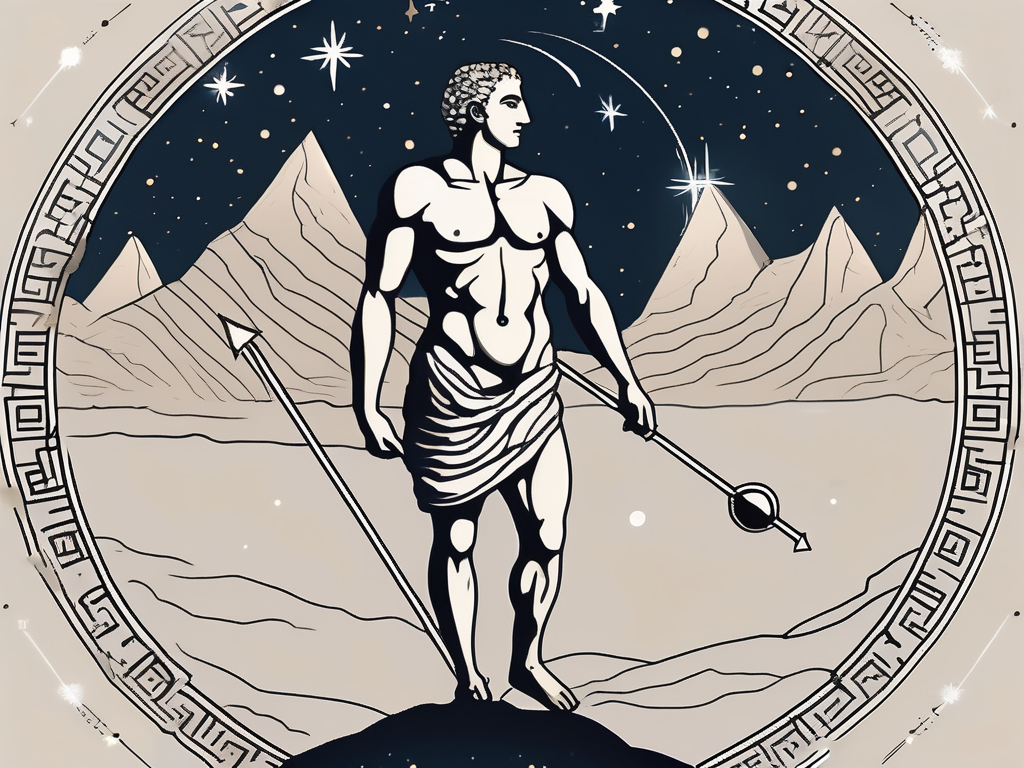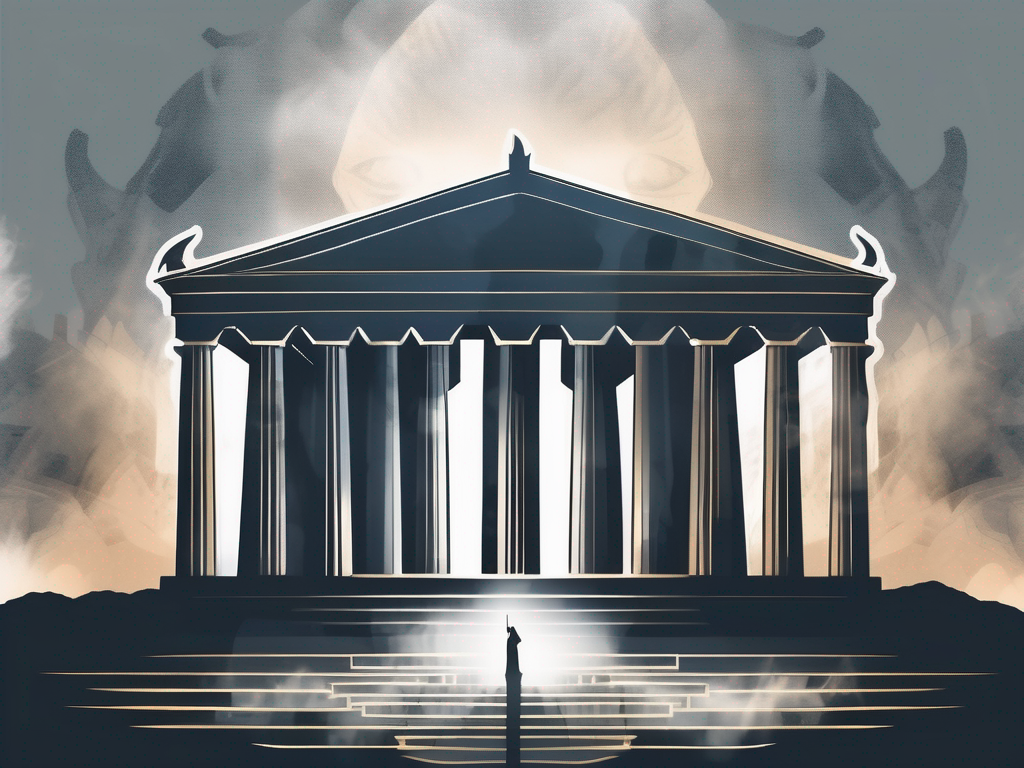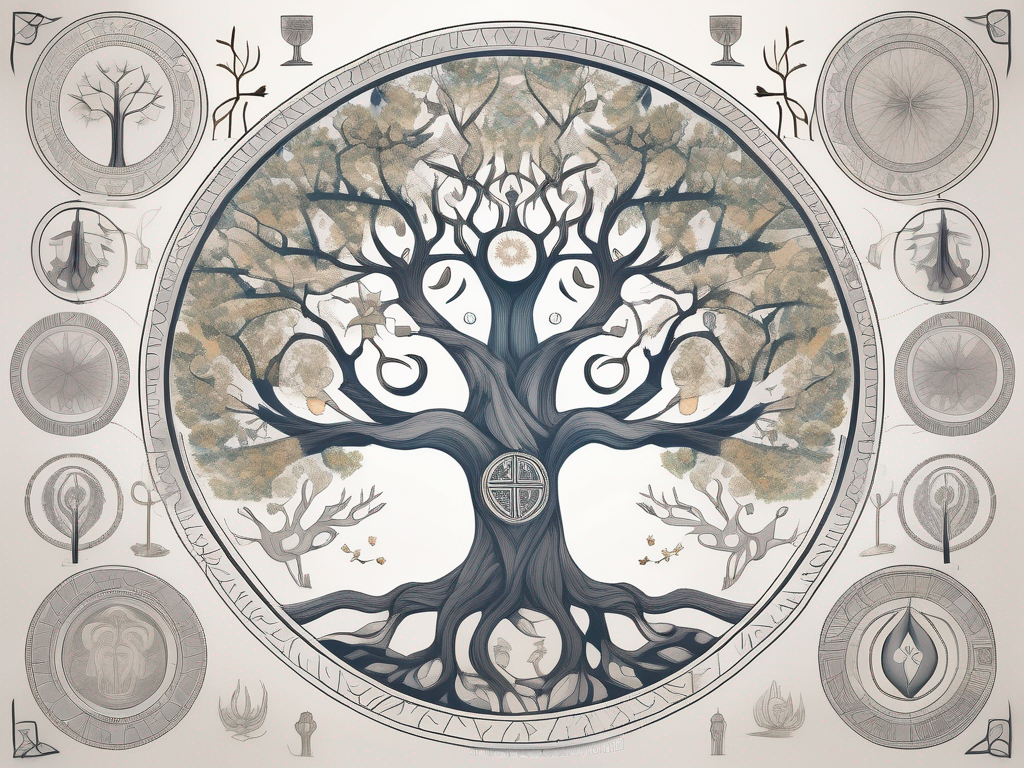Greek mythology is filled with fascinating gods and goddesses, each with their own unique stories and powers. One such deity that often gets overlooked is Iapetus, a Titan who played a significant role in the ancient Greek pantheon. In this article, we will delve into the mythology and powers of Iapetus, shedding light on his intriguing story and exploring the various aspects of his character.
Understanding the Role of Iapetus in Greek Mythology
Before delving into Iapetus’ story, it is important to understand his place in Greek mythology. Iapetus was a Titan, one of the primordial deities who predated the Olympian gods. Born to Ouranos (the personification of the sky) and Gaia (the personification of the Earth), Iapetus was part of a powerful divine family.
In Greek mythology, the Titans were a race of powerful beings who ruled during the Golden Age, a time of peace and prosperity. They were considered the predecessors of the Olympian gods, who eventually overthrew them. Iapetus, as one of the Titans, held a significant position in the divine hierarchy.
As the son of Ouranos and Gaia, Iapetus was connected to the very fabric of the universe. Ouranos represented the heavens, while Gaia symbolized the Earth. This lineage bestowed upon Iapetus a unique perspective and insight into the workings of the cosmos.
Iapetus in Ancient Texts
The ancient Greeks documented their myths and legends in various texts, providing us with valuable insights into the character of Iapetus. In Hesiod’s “Theogony,” Iapetus is mentioned as one of the Titans who fought against the Olympian gods in the Titanomachy, a divine war for supremacy. This conflict shaped the Greek cosmos and defined the roles of both the Titans and the gods.
The Titanomachy was a monumental event in Greek mythology, representing the struggle between the old order and the new. It was a battle for power and control, with Iapetus and his fellow Titans standing against the rising influence of the Olympians. The outcome of this war would determine the fate of the universe.
In other texts, Iapetus is portrayed as a somewhat enigmatic figure, often associated with mortality and mortality’s relationship to the divine. His story offers a captivating perspective on the intersection of gods and humans.
One such text, the “Prometheus Bound” by Aeschylus, explores the consequences of Iapetus’ son, Prometheus, stealing fire from the gods and giving it to humanity. This act of defiance against the divine order brought about punishment and suffering for both Prometheus and mortals alike. It is through this tale that Iapetus’ connection to mortality becomes more apparent.
Iapetus’ Family and Lineage
Iapetus’ family tree is impressive, to say the least. He was married to his sister, Clymene, and together they had four children: Atlas, Prometheus, Epimetheus, and Menoetius. These names might sound familiar since the exploits of Atlas and Prometheus are well-known in Greek mythology. Iapetus’ lineage is a significant aspect of his story, as it connects him to other prominent figures in mythology.
Atlas, Iapetus’ eldest son, is famously known for his role in holding up the celestial spheres on his shoulders. This punishment was a consequence of his involvement in the Titanomachy, where he fought alongside his father against the Olympians. Prometheus, on the other hand, is renowned for his gift of fire to humanity and his subsequent punishment by Zeus.
Epimetheus, Iapetus’ third son, is often overshadowed by his more famous brother, Prometheus. However, Epimetheus played a vital role in Greek mythology as the creator of animals and the distributor of their unique traits. Menoetius, the youngest of Iapetus’ children, is less well-known but is believed to have been a fierce warrior who also participated in the Titanomachy.
The Symbolism of Iapetus
Symbolism plays a crucial role in Greek mythology, and Iapetus is no exception. One of the key symbols associated with Iapetus is time. Some myths depict him as the personification of mortal life, representing the finite nature of human existence. This symbolism adds depth to his character and sheds light on his connection to humanity. Iapetus’ role as a bridge between gods and mortals further highlights the interplay of mortality and immortality in Greek mythology.
Time, as embodied by Iapetus, serves as a reminder of the fleeting nature of human life. It is a constant reminder that all things, including the gods themselves, are subject to the passage of time. This symbolism invites contemplation on the transience of existence and the significance of each moment in the grand tapestry of the cosmos.
Furthermore, Iapetus’ role as a bridge between gods and mortals emphasizes the complex relationship between the divine and the human. He embodies the duality of existence, existing in both the realm of the gods and the realm of mortals. This duality allows Iapetus to serve as a conduit for understanding and communication between these two realms, offering a unique perspective on the human experience.
The Powers and Abilities of Iapetus
Aside from his familial ties and symbolic significance, Iapetus possessed unique powers and abilities that set him apart from other deities. Let’s explore some of these extraordinary traits.
Iapetus as the God of Mortal Life
As mentioned earlier, Iapetus symbolizes mortal life, emphasizing the transient nature of human existence. This aspect of his character is perhaps his most defining attribute. Iapetus’ connection to mortality grants him insights into the human experience, allowing him to empathize with mortals and understand their struggles, joys, and sorrows.
Furthermore, Iapetus possesses the ability to bestow blessings upon mortals, granting them strength, courage, and resilience. Through his divine touch, he can infuse individuals with a renewed sense of purpose and a deep appreciation for the preciousness of life. This gift from Iapetus serves as a reminder to mortals to make the most of their limited time on Earth and to cherish every moment.
In addition to his empathetic nature, Iapetus has the power to heal mortal wounds. When called upon, he can mend broken bones, cure illnesses, and restore vitality to those on the brink of death. This miraculous ability showcases his compassion for humanity and his desire to alleviate suffering.
Iapetus and the Concept of Time
Another intriguing aspect of Iapetus’ powers is his association with time. In Greek mythology, time is often personified and linked to the passage of life. Iapetus’ connection to time reinforces his role as a god who is intimately connected to the mortal realm. His understanding of the ever-changing nature of time grants him a unique perspective on the human condition and the cyclical nature of life itself.
Moreover, Iapetus possesses the ability to manipulate time to a certain extent. He can slow it down or speed it up, allowing him to observe events in detail or hasten the progression of certain situations. This control over time grants him a strategic advantage in various situations, enabling him to navigate through challenges and make informed decisions.
Furthermore, Iapetus can use his mastery over time to grant mortals glimpses into their past or future. These visions serve as valuable insights, guiding individuals towards their destinies and helping them make choices that align with their true purpose. Through this gift, Iapetus empowers mortals to embrace their own agency and shape their lives in meaningful ways.
In conclusion, Iapetus’ powers and abilities extend beyond his symbolic significance. As the god of mortal life and time, he possesses a deep understanding of the human experience and the cyclical nature of existence. Through his empathetic nature, healing touch, manipulation of time, and gift of foresight, Iapetus plays a crucial role in guiding and empowering mortals on their journey through life.
The Cultural Impact of Iapetus
Now that we have explored the mythology and powers of Iapetus, let’s delve into the cultural impact he has had over the centuries.
Iapetus in Literature and Art
Iapetus’ story has found its way into various forms of artistic expression, including literature and art. Many authors and artists have drawn inspiration from his character, weaving his narrative into their works. From ancient Greek poets to modern-day novelists, Iapetus continues to captivate audiences with his complex backstory and intriguing role in mythology.
Modern Interpretations of Iapetus
In recent years, there has been a resurgence of interest in Greek mythology, leading to new interpretations of Iapetus. These contemporary perspectives explore his character from different angles, expanding upon the ancient myths and bringing them into the present. Through these interpretations, Iapetus continues to be relevant and thought-provoking, sparking conversations about mortality, time, and the human experience.
Theological Perspectives on Iapetus
In addition to his cultural impact, Iapetus has also garnered attention from theological perspectives, particularly in the realm of comparative mythology and modern paganism.
Comparing Iapetus to Other Deities
Comparative mythology seeks to draw parallels between different mythological traditions, highlighting the universal themes and motifs that appear across cultures. In this context, Iapetus often finds himself compared to other gods and deities from various mythologies, providing a broader understanding of his character and the archetypal roles he embodies.
The Role of Iapetus in Modern Paganism
Modern paganism, which encompasses various contemporary religious movements, often incorporates ancient myths and deities into its belief systems. Iapetus has become a significant figure within some pagan traditions, with worshippers drawing inspiration from his stories and incorporating him into their rituals and practices. This reinvention of Iapetus allows for a dynamic and evolving understanding of his role in the modern world.
Debunking Common Misconceptions about Iapetus
Throughout history, misconceptions and misunderstandings have arisen surrounding mythological figures, and Iapetus is no exception. Let’s debunk some of the common misconceptions about him.
Iapetus and the Titanomachy
One common misconception is that Iapetus fought against the Olympian gods in the Titanomachy. While the other Titans did engage in this epic battle, Iapetus chose not to partake in the conflict, instead aligning himself with neither side. This choice showcases Iapetus’ unique perspective and adds complexity to his character.
Iapetus’ Relationship with Prometheus and Atlas
Another misconception revolves around Iapetus’ relationship with two of his sons, Prometheus and Atlas. Some believe that Iapetus had a strained relationship with Prometheus due to the latter’s defiance of the gods, while others claim that Iapetus was a nurturing father figure. Similarly, there are conflicting tales regarding Iapetus’ involvement in Atlas’ punishment. These differing narratives highlight the diversity and richness of mythology, leaving room for interpretation and multiple perspectives.
In conclusion, the mythology and powers of Iapetus offer a captivating journey into the world of Greek gods. From his role in ancient texts and his intriguing symbolism to his unique powers and abilities, Iapetus continues to captivate both scholars and enthusiasts. Furthermore, his cultural impact and theological perspectives demonstrate the enduring relevance of mythology and its ability to inspire and provoke thought. So, the next time you dive into the fascinating realm of Greek mythology, remember to give Iapetus the attention he deserves.












